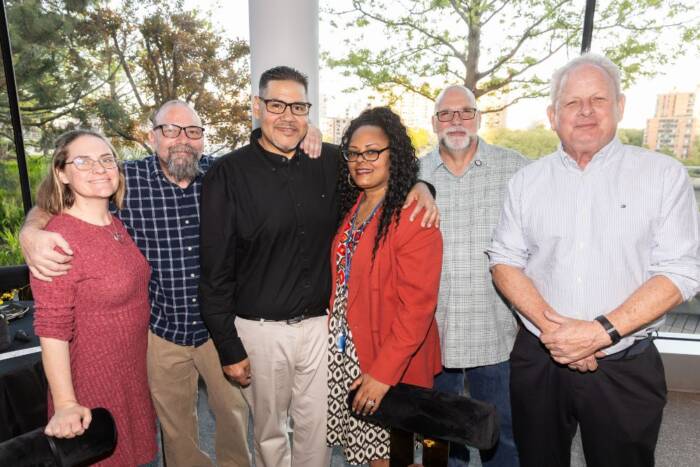Helen Hobbs receives Rockefeller’s Pearl Meister Greengard Prize
by Katherine Fenz, media relations manager
Helen Hobbs, a cardiology researcher, received the 2015 Pearl Meister Greengard Prize during a festive event in the Caspary Auditorium last month. The award, which Dr. Hobbs received for her pioneering research into the genetics of high cholesterol and heart disease, was presented to her by Rachel Maddow, host of the Rachel Maddow Show on MSNBC.
The annual Pearl Meister Greengard Prize was established in 2004 to honor outstanding female scientists. Nobel laureate Paul Greengard, Vincent Astor Professor and head of the Laboratory of Molecular and Cellular Neuroscience at Rockefeller University(opens in new window), donated the entire monetary share of his Nobel Prize to create this international award together with his wife, sculptor Ursula von Rydingsvard, and other generous supporters. “In addition to Dr. Greengard’s incredible scientific achievements, he has an equally great legacy in using his platform on behalf of women,” Dr. Maddow said. “Men at the top of their fields don’t generally tend to do that.”
“I want to thank you for honoring not just me, but all women in science,” Dr. Hobbs said in her remarks. Asked about how she has succeeded throughout her career, she replied, “Science is like surfing. Sometimes you’re in the whitewater, going nowhere, and nothing is working. Then suddenly, you catch a wave. Those are the moments you really hold on to.”
Breakthrough in genetics of heart disease
Dr. Hobbs’s research focuses on genetic factors that contribute to metabolic disorders and heart disease. Her work was the first to show that genetic mutations inhibiting a protein called PCSK9 lead to low levels of low-density lipoprotein, considered the harmful cholesterol. This discovery is the basis for several drugs targeting PCSK9 that were approved this year by the U.S. Food and Drug Administration.
More recently, Dr. Hobbs has identified a genetic variation that predisposes to fatty liver disease, a chronic condition that can lead to cirrhosis and affects roughly one-third of Americans.
“We founded the Pearl Meister Greengard Prize to honor the extraordinary work of established women scientists and to motivate young women considering careers in the sciences,” says Dr. Greengard. “Dr. Hobbs’ work is nothing short of inspirational—she is unraveling the genetic underpinnings of cardiovascular disease and changing the way we look at one of the most common, complex health issues of our time.”
Named after Dr. Greengard’s mother, who died during his birth, the prize carries a $100,000 honorarium. Winners of the Pearl Meister Greengard Prize are selected by a committee of ten scientists, five of them recipients of the Nobel Prize. Among the 11 previous winners of the Pearl Meister Greengard Prize, two have subsequently won the Nobel Prize and another received a Lasker Award.
An inspiring career
Dr. Hobbs graduated from Stanford University and Case Western Reserve University School of Medicine. After completing an internship in internal medicine at Columbia-Presbyterian Medical Center, she served as chief resident in internal medicine at Parkland Memorial Hospital in Dallas, Texas. She joined the faculty of the University of Texas Southwestern in 1987.
Dr. Hobbs is currently the director of UT’s McDermott Center for Human Growth and Development. She also directs the Dallas Heart Study, a longitudinal, multiethnic, population-based study that focuses on defining the genetic determinants of plasma lipoprotein levels and cardiovascular risk.
A member of the National Academies of Sciences and Medicine, Dr. Hobbs is the recipient of many other honors, including the American Heart Association’s Distinguished Scientist Award. Most recently, she was awarded a 2015 Breakthrough Prize in Life Sciences.


